Toxic Thoughts started early for me, as I was exposed to diet “tricks” and “hacks” at just 12 or 13—like many women.
I was continually reminded of the value of dieting, reducing weight, and appearing slender by the periodicals and movies I watched.
I started comparing myself to the slender actresses in movies, the magazine models with their ideal “beach bodies,” and the women in music videos with flat stomachs when I was a self-conscious teenager.
This self-consciousness further intensified when I saw ladies in my class being made fun of for being “ugly” and “too heavy.”
The idea that there was only one kind of “ideal figure” made me feel inadequate.
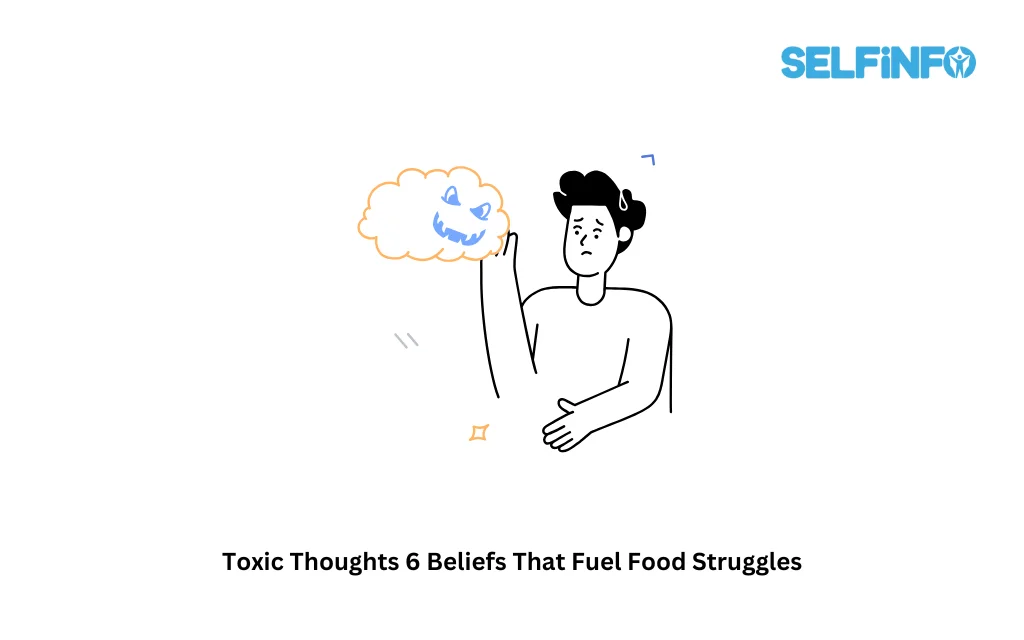
How I Broke My Relationship with Food
I started paying attention to the diet tips advertised on magazine covers because I felt inadequate.
My connection with food changed at this point.
Food ceased to be an enjoyable experience and instead became a means of constructing the body I believed I desired.
My experience was not as horrific as what other ladies have gone through, to be perfectly honest. I never threw up. I kept eating for days on end. However, every time I got a stomach sickness, I was relieved since my stomach appeared perfectly flat.
I made the mistake of experimenting with green juices. I would “endure” the taste of spinach and cucumber juice, so I would instantly give myself permission to overindulge in pizza and other meals after drinking it.
Like I was doing algebra in school, I started to count calories on a chalkboard.
I made the decision to consume just fluids and extremely soft foods in little amounts for a while.
After a few months of my “experiments,” my mother said I looked too thin, and my father began remarking that the bones in my wrists were more obvious. However, to my teenage self, “too thin” did not exist.
The doctor told me I was underweight when I had another stomach virus and prescribed a weight-gain pill.
I was appalled at the thought of gaining weight. To the dismay of my mother, I declined.
The irony was that, despite my daily dietary restrictions, I had no trouble indulging in cake and ice cream while watching television in my room. I believed that these delicacies were my rewards for eating little most of the time.
It became a bittersweet experience to eat. I worried, ate too little, and evaluated how everything I ate affected my weight when I was in “diet mode.” When I was in “binge mode,” I ate anything I wanted, feeling guilty and frustrated that I would soon have to return to my “diet.”
When My Body Said “Enough”
I experienced stomach issues for the most of my adolescent years due to my irregular and malnourished eating habits.
When I experienced severe intestinal problems while on vacation, it was a turning moment in my life.
I felt bloated, experienced persistent stomach pain, and was unable to properly digest my food for about two weeks.
There were no clinics or doctors nearby because we were on vacation at my grandparents’ cottage in the Costa Rican countryside.
To ease my pain, my grandfather prepared a tea for me using ginger and digestive herbs from his garden.
I was surprised when my stomach issues subsided that same day, and two days later I felt fantastic.
When the drugs I had been using for years failed to relieve my stomach issues, I was perplexed as to why drinking tea helped me recover.
I came to understand that eating could heal my body at this point.
I started reading up on what food could do for me on an internal level. I quickly became aware of the harm that my diet was causing to my body.
Almost immediately, I made the decision to start eating whole foods, primarily plant-based meals.
I wanted to mend my relationship with food while also healing my body.
Food became, in my mind, what it always ought to have been: a source of joy and nourishment.
Today, I have discovered how to eat with joy and mindfulness, how to eat instinctively, and how to treat my body with love and acceptance.
Our Thoughts About Food Matter
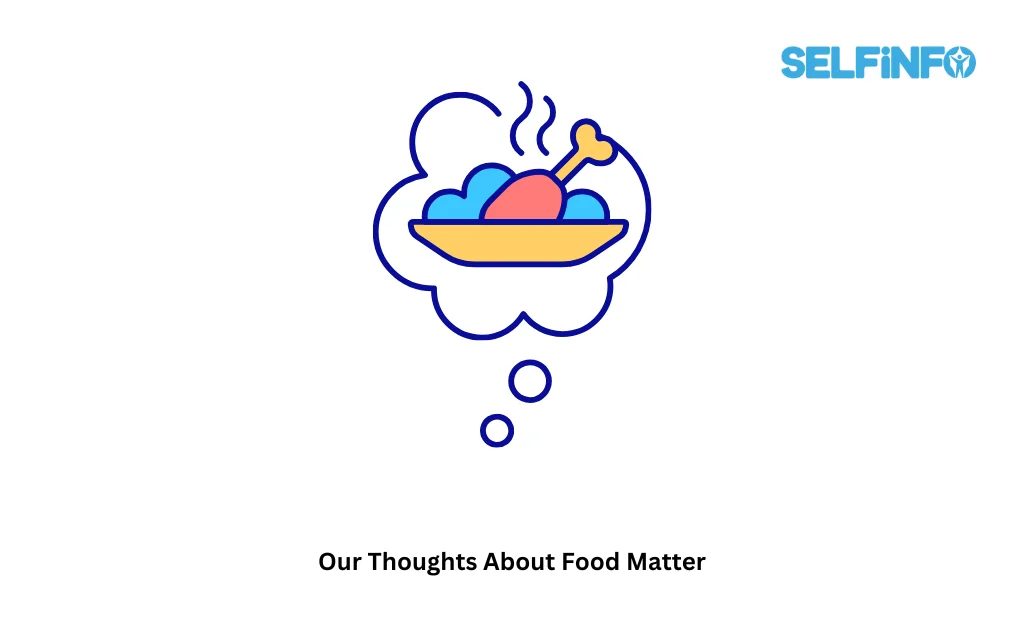
In retrospect, I see how harmful my food-related beliefs were.
I ate in ways that harmed my body because I saw food as my enemy—too little, too much, and never with complete enjoyment. Many people in our diet-crazed society experience this.
This post aims to assist you in recognizing and changing the ideas that are negatively impacting your connection with food and preventing you from enjoying meals.
Your thoughts and views are reflected in the way you eat.
I want to assist you in taking a step back and changing your perspective in order to mend your connection with food if you have been having trouble with dieting, calorie obsession, and meal restriction.
Eating thoughtfully and enjoyingably can be achieved by letting go of these six harmful food-related ideas.
1. Thinking of food as a reward.
The goal of eating with delight is defeated when a good diet is rewarded with bad food, such as on cheat days.
Cheat days might reduce your enjoyment by making your regular meals look less pleasurable in contrast.
Additionally, cheat days can escalate into episodes of binge eating that cause emotional and physical distress. Neither your happiness nor your health will benefit from this.
Allowing oneself to periodically indulge in moderate amounts of unhealthy foods rather than saving specific times or days to overindulge in junk food is a more conscious strategy. Do not think of these indulgences as “prizes” or “rewards” that are only given on special occasions.
Eat nutritious cuisine that brings you joy every day at the same time. Do not only eat dull or bland cuisine at meals. Increase the variety of meals you eat each day to ensure you always eat wholesome, enjoyable meals.
2. Using food as a punishment.
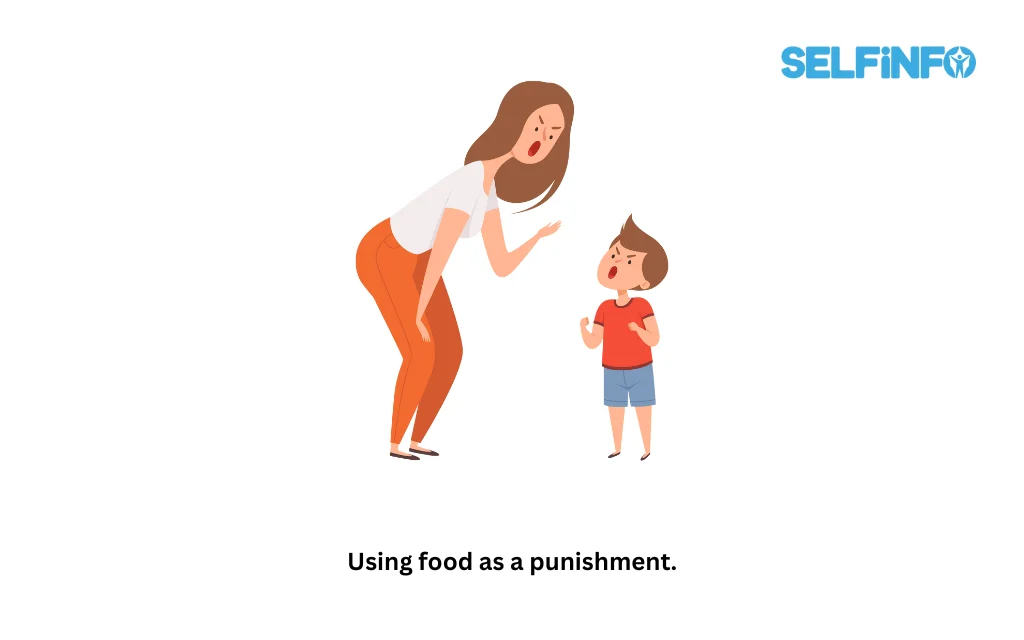
It is as harmful to use food as a reward or as a punishment.
Eating less or not eating at all to “punish” yourself for overeating will just serve to confirm the idea that you have been “evil,” which will increase your food-related anxiety and paranoia.
To compensate for binge episodes or because you feel “fat,” you could force yourself to eat only particular foods that you loathe, including green juices, “detox” teas, or salads. This will deprive your body of the nutrition it needs and make you miserable.
Torturing yourself is not the solution; you do not have to deny your body.
Practicing self-love is the best way to break this cycle. Recognize that you do not have to punish your body; instead, appreciate it and yourself.
Whole, wholesome foods are abundant in a healthy diet that keeps you in shape. Do not stop eating if you wish to start anew. Increase your intake of whole grains, soups, quinoa, beans, lentils, berries, almonds, and all the vegetables you can think of. You should also drink lots of water.
3. Thinking of food as comfort.
When we view food as a source of comfort, we engage in emotional eating.
I believed that cake made me “happy,” therefore I ate it frequently throughout the week. Cake gave me a brief sense of sweetness when I was a lonely teenager.
It is addicting to turn to food as a coping mechanism for emotions such as sadness, anger, loneliness, or hurt. The longer we continue to equate eating with “happy,” the more difficult it is to break the habit.
Relying on food to make you feel better eliminates the chance to address your issues in a constructive manner.
When things seem horrible, the best thing you can do for yourself is to actively look for healthy coping mechanisms, and there are many of them.
More efficient and healthful methods to improve your mood include working out, meditating, reading, listening to music, taking a stroll, playing with a puppy or kitten, coming up with solutions to your issues, learning a new skill, napping, and chatting to friends.
4. Seeing food as something “prohibited.”
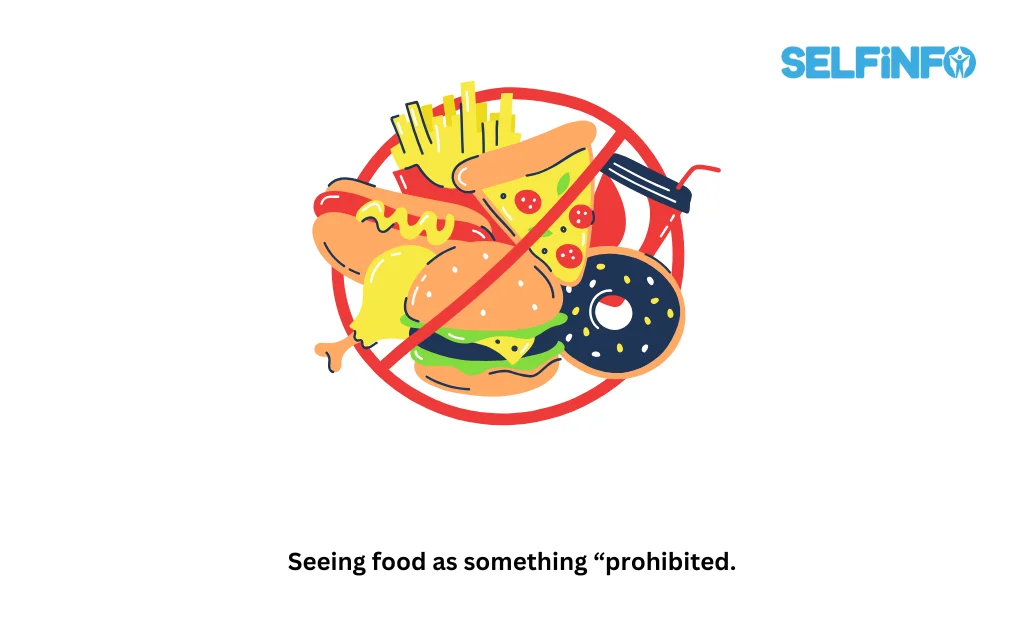
According to studies, following a rigid and inflexible diet would cause stress and might not even reduce your intake of food.
Food restrictions frequently prevent you from completely enjoying the dishes on your plate because they cause you to have thoughts and cravings about the foods you are “forbidding,” such as sugar, brownies, ice cream, or donuts.
Research indicates that those who follow dietary restrictions think about food more than others who don’t.
It goes without saying that this will not make you feel content or at peace with your meal.
I am not advocating that you should eat anything you want and without restrictions, but rather that you concentrate your energies on incorporating healthy items into your diet rather than hurriedly banning them.
If you only concentrate on eating more complete meals, your mind will be at ease and you will eat healthier without even realizing it. Banning harmful foods causes stress and is unproductive.
5. Seeing food as entertainment.
Do you eat popcorn at the movies because it is customary or because you are actually hungry?
Most likely, it is the latter. Popcorn is a component of the entertainment experience in this case.
However, you will overeat and fail to appreciate your meals if you start using food as a way to pass the time whenever you are bored.
Eating thoughtfully entails paying attention to what you eat and savoring it.
You will not be able to appreciate your meals as much if you use food as a diversion.
Find productive ways to keep your mind busy rather than turning to food as entertainment.
Engaging activities are beneficial for your mind and body, such as playing games, reading novels, organizing, painting, or working out.
6. Measuring your self-worth based on how much you eat.
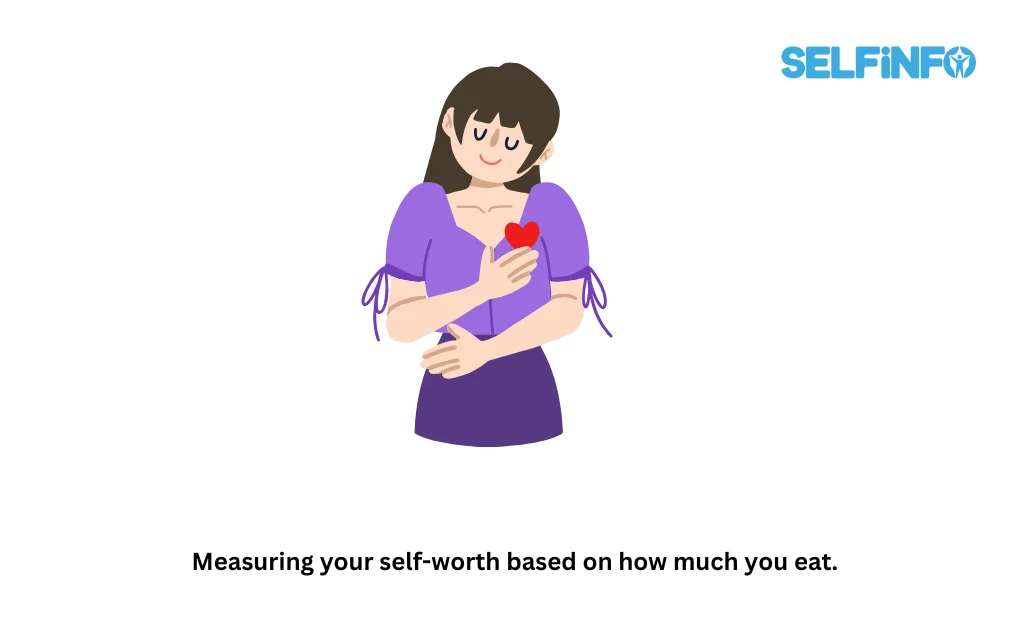
Lastly, avoid using food as a gauge of your value.
What or how much you consume does not define who you are.
Your relationship with food is harmed and your enjoyment is stolen when you beat yourself up about what you eat.
Do not be upset with yourself if you think your diet has not been healthy. Whenever you want to, you can always adjust your diet and create a positive change.
It is critical to view food as an ally rather than an adversary.
Food should not limit you in any way or cause you to feel anxious or guilty.
It is there to help you feel your best, to support and nourish you.
Transforming the negative ideas that prevent you from enjoying your meals to the fullest is the first step towards healing your relationship with food.
